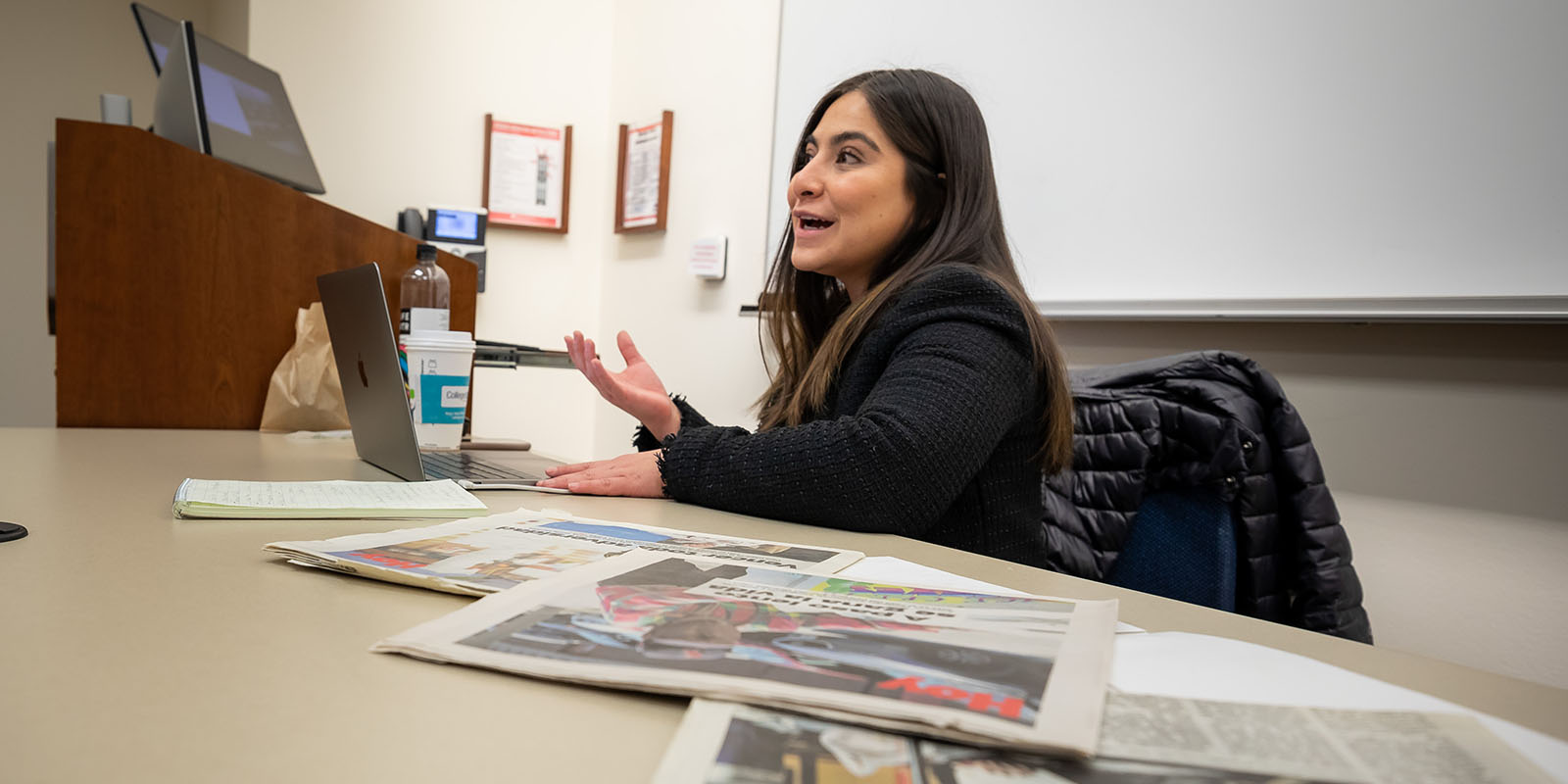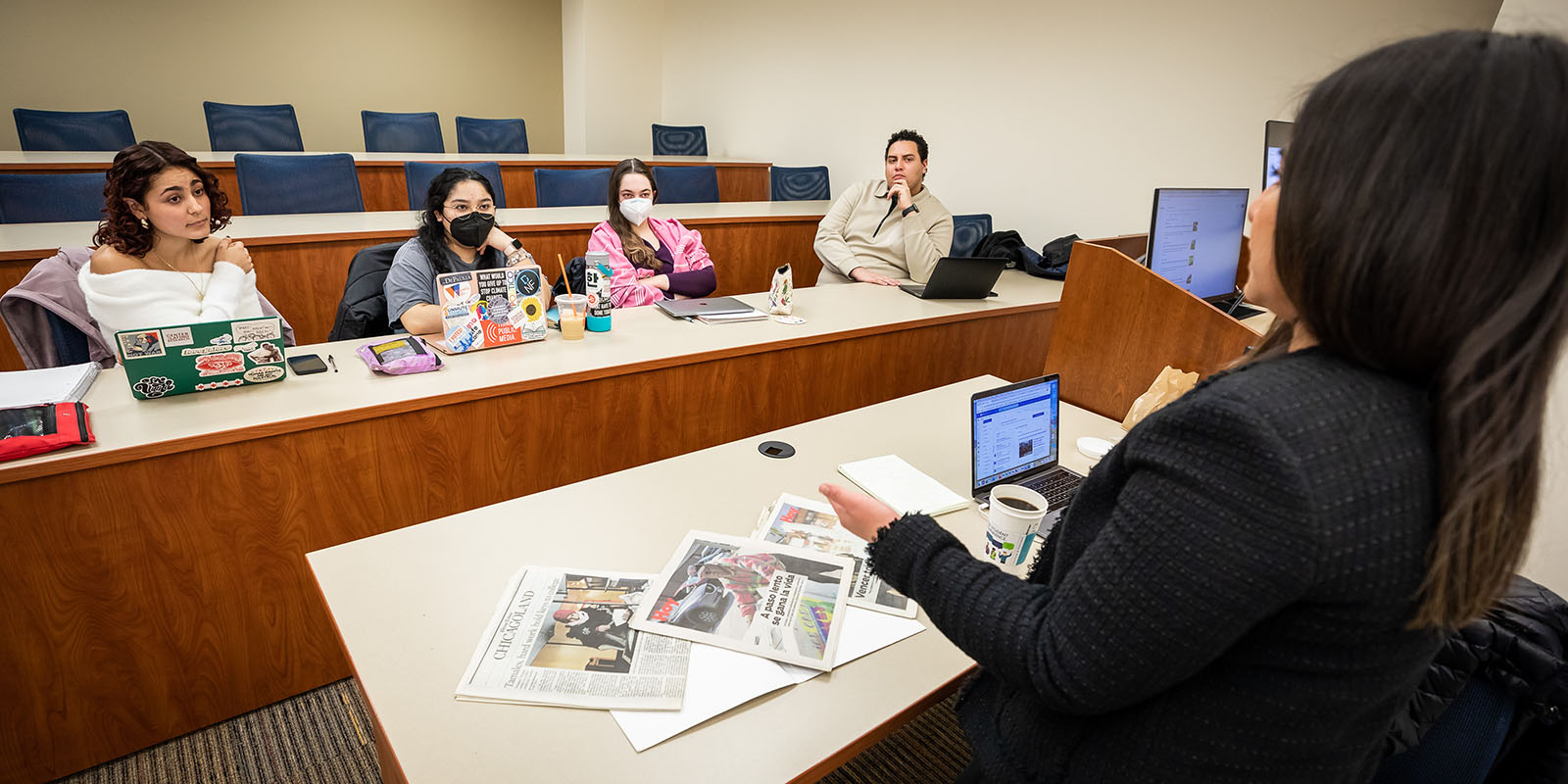 Laura Rodriguez Presa, a reporter for the Chicago Tribune and DePaul alumna, shares lessons from her career in a new, bilingual journalism class at DePaul, JOUR 290: Reporting on Latinx Communities. (DePaul University/Jeff Carrion)
Laura Rodriguez Presa, a reporter for the Chicago Tribune and DePaul alumna, shares lessons from her career in a new, bilingual journalism class at DePaul, JOUR 290: Reporting on Latinx Communities. (DePaul University/Jeff Carrion)
In the fall of 2020, as Chicago faced yet another wave of coronavirus cases, Laura Rodriguez Presa
wrote a story for the Chicago Tribune about the challenges for hospitalized COVID-19 patients who didn't speak English.
Rodriguez Presa conducted many of the interviews in Spanish and wrote the story in English, sharing critical findings that a language barrier could put people at a higher risk for complications from COVID-19. Now Rodriguez Presa is sharing lessons from her career and experiences such as this one in a new, bilingual journalism class at DePaul, "JOUR 290: Reporting on Latinx Communities."
The course meets the needs of DePaul students, particularly those from a Latino background, who want to enhance their skill in reporting on diverse communities.
Rodriguez Presa and her students recently analyzed her COVID-19 article during class. Nadia Carolina Hernandez, a junior journalism major, says they discussed strategies for translating sources' quotes from Spanish to English while keeping the emotion and feel intact.
"It goes back to journalistic principles about not wanting to misquote a source. You want to keep that sentiment and emotion," Hernandez says. "It's something that's very important and very nuanced. It's something I've never talked about in any other journalism class."
Hernandez serves as president of DePaul's chapter of the National Association of Hispanic Journalists (NAHJ).
The chapter advocated in the fall for more support for Latinx journalism students, and that was the impetus for Rodriguez Presa's hiring and her new class.
 Students in Laura Rodriguez Presa's JOUR 209: Reporting on Latinx Communities discuss strategies for translating sources' quotes from Spanish to English while keeping the emotion and feel intact. (DePaul University/Jeff Carrion)
Students in Laura Rodriguez Presa's JOUR 209: Reporting on Latinx Communities discuss strategies for translating sources' quotes from Spanish to English while keeping the emotion and feel intact. (DePaul University/Jeff Carrion)
Hernandez says she deeply appreciates the real-world perspective Rodriguez Presa brings to the classroom. Rodriguez Presa, a 2014 DePaul graduate, has worked for the Chicago Tribune for nearly eight years. In addition to tactics for reporting and writing in different languages, she emphasizes to students how to cover the Latino community, particularly in Chicago, where the population is growing.
"My challenge, and what I discuss with my students, is how to find a balance where we write stories that captivate the non-Latino audience but also respect the essence and the experiences of the Latino community," Rodriguez Presa says. "So that the community knows that this is not just for others, but this is also for them."
For Hernandez, one of the most enlightening parts of the class has been exploring how to develop human-centered narratives. She says some in the journalism industry view covering the Latino community as only reporting on immigration, which she agrees is a critical part of the story. But she wants to go deeper than stories about the number of immigrants arriving to Chicago.
"It's about people's stories about why they came here, what they're looking for, how they are feeling supported," she says. "Just basing stories on numbers can seem very dehumanizing. And I want people to see that there are real human lives and real human beings behind all of this. And really amplify them and uplift them."
Rodriguez Presa also serves as a co-advisor for the two Spanish-language student media publications,
La DePaulia and
Pueblo. The growth of these publications and of interest in bilingual reporting coincide with the growth in the number of students with Latino or Hispanic backgrounds at DePaul, says Jason Martin, chair of the Department of Journalism.
"Those developments raised the opportunity to bring aboard an expert in Spanish-language reporting in Chicago, and one of the top journalists with those skills and reporting on those topics happens to be one of our alumni," Martin says.
Rodriguez Presa says returning to DePaul to teach is "a dream come true," and she aims to be the teacher and mentor she wanted during her college years. The class is small, just five students, but Rodriguez Presa says students' enthusiasm and engagement show how much the content is needed. She also emphasized that the class is not just for students who are Latino. Students do not need to be bilingual to participate in the class.
Robin Hoecker, a journalism professor and faculty co-advisor for DePaul's NAHJ Chapter, agrees the bilingual journalism class is important for students of all backgrounds.
"More than a quarter of Chicago's population is Latine, and many speak Spanish as a first language, as do many of our students at DePaul," she says. "It's important for all of our students to understand this segment of our community."
Rodriguez Presa will continue advising the Spanish-language publications and teach the class again in the spring quarter. She says a fulfilling part of teaching is helping students challenge the narrative that Latino journalists are biased in covering their community.
"They understand that we are an important fabric of the city, of this country. And it's important to be taken into consideration and covered as such," she says.
Mary Hansen is a manager of strategic communications in the University Marketing and Communications division.